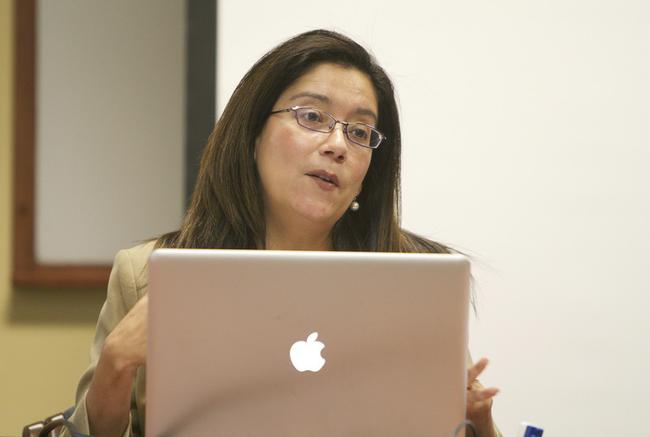
As part of the Diversity in Action seminar series, Women’s and Gender Studies Professor Rebecca Martínez discussed the issues of sexism and classism surrounding treatment for cervical cancer.
Martínez presented “Configuring Cervical Cancer in Venezuela: Comparative Considerations for Latinas in the United States” on Thursday in Memorial Union.
“I’m really interested in the way we think of science, medicine and technology,” she said. “It is not necessarily a part of culture but a product of culture.”
As a Fulbright Scholar, Martínez studied patient and doctor interactions in Venezuela. She said class and medical treatment blur together.
“Often the lower-class women feel that they can’t ask the doctor basic questions,” Martínez said. “There is a certain amount of ridicule of lower-class women. Just because a woman doesn’t ask questions does not mean she doesn’t have any.”
Venezuelan doctors put heavy emphasis on the relationship between promiscuity and low culture, she said.
“Doctors in Venezuela attribute cervical cancer to lack of hygiene and deprived culture, among other things,” Martínez said. “This caught my attention.”
Promiscuity is often seen as a badge of honor for men, she said. However, for women, it is believed to be morally wrong and the leading cause of cervical cancer.
“Women’s promiscuity is seen by Venezuelan Cancer Society President as a social problem,” Martínez said. “But it is not a social problem because women are dying (from cancer), but because of delinquent orphans who might endanger the health of the nation.”
Martínez found similar prejudices and biases within the U.S. treatment of cervical cancer. Although we might think of ourselves as a modern nation, sexism and racism still exists, she said.
“We live in a shared world with shared ideas and we are exposed to a society with shared biases,” she said. “It’s hard to expect health care providers to leave their unconscious biases at the door. It is important to be aware.”
Nancy Flores, who attended the lecture, said she found it interesting that a U.S. doctor would have the same perspective as a Venezuelan doctor.
“Women are at the same disadvantage,” Flores said. “It reminds me of Oaxaca, Mexico, where my mother was born. Promiscuity is not a big issue there, but there are still many cases of cervical cancer. (Promiscuity) is a good tool to control women’s sexuality.”
Noel English, director of MU Equity for the Chancellor’s Diversity Initiative, said the Diversity in Action series supports a culture of respect and responsibility.
“We have hundreds of researchers at the university who are looking at all sorts of fascinating topics that help us understand who we are and how we interact with the world,” English said. “I come to the lectures thinking, ‘This topic has nothing to do with me,’ but then I stand spellbound.”